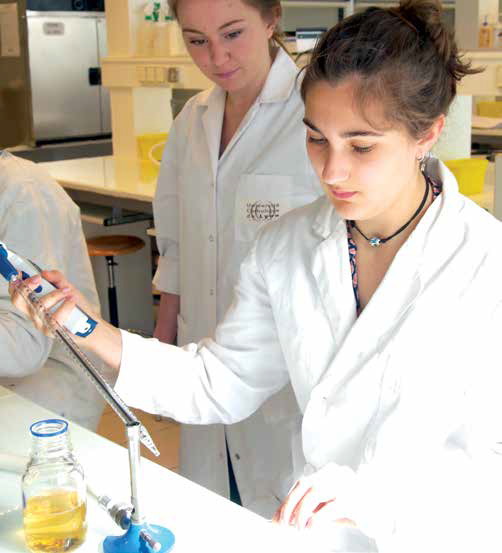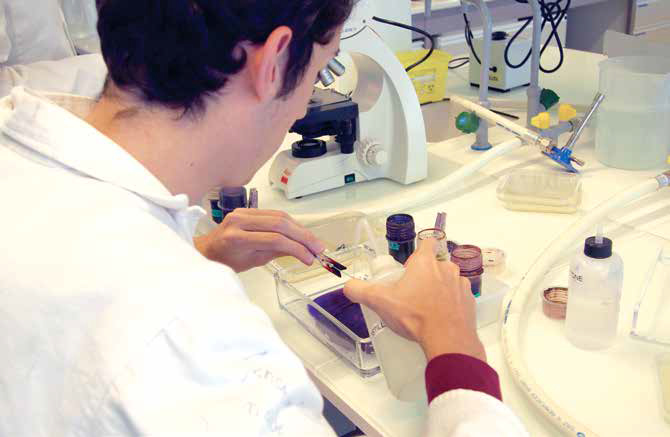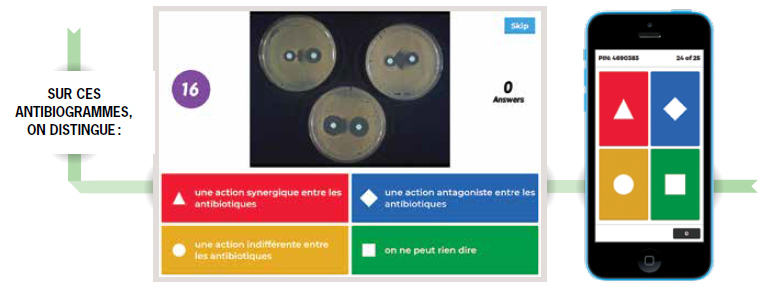Flipped learning to get students actively involved in their training course
What do a lecture in genetic engineering, an introduction to experimental scientific practice and revisions in microbiology have in common? The answer is that all of the above have been subject to educational innovations which have been implemented at the Graduate School of Biology-Biochemistry-Biotechnologies (ESTBB)
Large groups, disparities in levels, passive students: to deal with all the usual problems associated with teaching, ESTBB has set up a range of teaching methods that rely on digital technology.
Setting up a lab experiment from scratch
It all begins by selecting an issue. Students then broaden their knowledge by doing their own bibliographical research, devising an experimental protocol to test a hypothesis, and ordering the reagents needed. They then conduct their experiment and interpret the results. Flipped learning is used in two curricula dispensed by the Graduate School of Biology - Biochemistry - Biotechnologies to put students in a position where they can conduct their own experimental research projects, under the supervision of Heads of Studies Rozenn Deligny-Llop and Elodie Niepceron.
“Because it spans several months, this project enables students to be actively involved in devising an experimental approach to test a hypothesis,” explains Rozenn Deligny-Llop, Education Manager of the Life Sciences bachelor’s degree. “Usually, they conduct practical work sessions, where everything has already been thought out and finalised by the tutor: in other words, all they have to do is turn up and then put their feet up! The idea behind this module is to reverse things: in this case they are in charge of doing all the thinking beforehand, and all the preparatory work prior to conducting the experiment.” Students discover how difficult it is to design a rigorous experimental protocol and the time devoted to preparing an experiment, which can be complex in biology. This is also an opportunity for them to use project management tools to coordinate and plan the many intermediate deadlines and the different deliverables.
Flipped learning for Science lectures in English
In some of the Faculty’s curricula, biology lessons are taught in English. This is a good way to maintain our students’ language levels and teach them the scientific and technical vocabulary they will use throughout their future careers. Flipped learning is carried out to support these lessons and encourage everyone’s understanding, regardless of students’ levels of English. Both tutors concerned, Emmanuelle Gormally and Philip Lawrence, have perfected a system based on working in small groups after each lesson. Some students write a summary presentation of the previous lesson in French, which they then present in front of the class during the next lesson. Other groups draw up a glossary of new terms learnt during the lesson, with French translations and definitions, or devise multiple choice questions on the previous lesson.

Moodle, a collaborative platform
The work produced by the students are then made available to other students via the Moodle learning platform. They are then corrected and commented on by tutors, again on the platform. “Students enjoy this active and flipped learning method, where they produce their own documents to help them understand lessons, confirms Genetic engineering teacher Philip Lawrence. The presentations at the beginning of each lesson enable them to check that they have properly understood the previous lesson, and fill in any missing bits. The glossary, which is built up lesson after lesson on Moodle, is of course essential when it comes to mastering English vocabulary, which is one of the objectives of teaching science in English. And finally, they use the multiple choice question bank as a revision tool before the exam.”

Active and interactive revisions
How can you make revision sessions less tedious, and get everyone involved? Elodie Niepceron, a Microbiology teacher, has chosen Kahoot! and Jeopardy, two gaming platforms, to provide active revisions. Kahoot! is good for organising online quizzes that are accessible on smartphones or computers. She uses them during sessions, and the results displayed in real time enable her to go over areas that have not been properly understood after each question. With Jeopardy, the principle is well known: you have to find the question on the basis of the answer; an excellent way to test whether or not the definitions and technical terms learnt during the lesson have been properly assimilated. To add a bit of fun, she uses buzzers to encourage competition between teams. “In all classes there are students who prefer to go unnoticed,” adds Elodie Niepceron. “Those who never put up their hands, and tend to wait for someone else to come up with an answer, or never say anything, even when they don’t understand. I use the interactive aspect of Kahoot! and the fun side of Jeopardy to get everyone involved. And it works! These revision sessions are very dynamic, and students enjoy them.”
Example of an online quiz used with a smartphone during a class:
